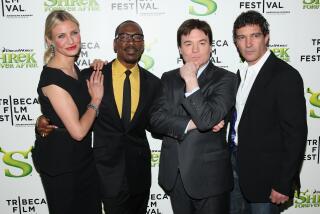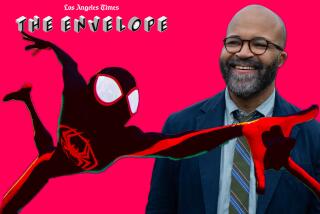‘Shrek’s’ Mike Myers ponders a happy-sad ending
Back when Shrek, a fearsome, swamp-dwelling ogre, first entered the film landscape nearly a decade ago, hardly anyone involved imagined the unsightly animated creature could become internationally beloved. Even the man who wound up voicing the role had early reservations.
“Jeffrey asked me if I’d be interested in being in an animated movie … called ‘Shrek,’ “ Mike Myers said with a grimace last week as he recalled his conversation with DreamWorks Animation Chief Executive Jeffrey Katzenberg. “And I said, ‘Is that really the title? That’s not a really great title,” he said of the film that just had its fourth — and, according to the studio, final — installment, “Shrek Forever After,” open Friday.
Still, he was intrigued. At the time, the comedian was riding high with his zany ‘60s British spy character Austin Powers. But in the storybook world of “Shrek,” he found something compelling.
“When I first saw the mock-ups, I thought it was this unbelievably cool, immaculate universe,” Myers said, leaning back in a chair in his hotel room. “I was like, this is a really brilliant deconstruction of fairy tales. And it’s about class.”
Because the Canadian actor viewed Shrek as a “working-class person,” he initially tried out a Canadian accent for the character. But he wasn’t connecting. So he opted for a voice he’d established during his run on “Saturday Night Live,” a character called Lothar of the Hill People. The tone was so gruff he lost his voice after two days.
“And then I was like, ‘I’m of Scottish heritage, maybe Scottish is the way to go. Scottish people are the salt of the earth.’ And when I connected, everybody was like, ‘Oh, yes, this is right.’ ”
The voice was such a good fit that the studio opted to toss out all of the work that had already been completed on the first film — which Myers estimates to be about 60% — and start fresh with the new direction.
Of course, “Shrek” has since defied the odds, becoming an international phenomenon and pop culture touchstone. The first three films in the franchise grossed more than $2 billion worldwide, and the original film won the first Academy Award for animated feature. The movies have premiered at prestigious film festivals, including Cannes. There has been a Shrek television Christmas special and a Broadway production, “Shrek the Musical.”
So it’s no surprise that with its lengthy run, starting in 2001, it’s been difficult for some of the cast members to say goodbye to the characters they’ve played for so many years.
“I’m really sad, actually,” said Cameron Diaz, who voices Fiona, Shrek’s half-ogre, half-princess wife. “I think we’ve all kind of been going, ‘Is this really it?’ It’s something that’s been a constant in all of our lives for so long. As soon as one film would come out, six months later Jeffrey would call you and tell you to come look at storyboards for the next film. In a weird way, I did feel like it was going to go on forever, because why wouldn’t it? Everyone loves Shrek.”
Shrek’s journey has resonated because the ogre is so human, Myers believes.
“There’s something in Shrek that he feels he’s not good enough to fall in love, to be married, to be a father. And in the last one, he’s not good enough to have a happily ever after,” he said. “Maybe because I grew up in a country next to the big country, I could kind of relate to that. I think the feeling that you’re not enough and wondering about your identity is pretty universal.”
But how much the films have come to mean to his career, Myers said, has surprised him.
“I feel like a custodian at Yellowstone,” he said. “I can’t account for how wonderfully impactful to the culture it’s been, but it’s been great to be a part of it. And I didn’t know a person was allowed to care that much about a character in the world of animation, and that was a really awesome revelation.”
Cast mate Antonio Banderas believes the success of Shrek lies in Myers’ serious approach to the ogre.
“Weirdly enough, because he’s an amazing comedian and a man that makes people laugh for many years now, what he brought to the character is something very profound,” he said. “Security. Maturity. Logic.”
“He doesn’t just see this as a cartoon for kids,” added the film’s director, Mike Mitchell. “When it comes to having knowledge about storytelling and filmmaking and character arc, he’s very serious.”
“Forever After” finds Shrek fed up with being a family man. No one in town is scared of him anymore. His kids crawl into his bed every morning, waking him up. He’s tired of changing diapers. Enter Rumpelstiltskin (Walt Dohrn), the villain who lures Shrek into a mysterious deal that transports the ogre back to his old life for just one day. Things seem great at first, until Shrek realizes that Rumpelstiltskin is now king of Far Far Away and none of his beloved friends — Donkey ( Eddie Murphy), Puss in Boots (Banderas) and even Fiona — recognize him.
It’s an appropriate place to end Shrek’s story, believes Mitchell. “We felt it really encapsulated all the previous “Shreks” and brought the story to a satisfying conclusion,” he said. “But I’m sure if this does phenomenal, that Jeffrey will make another.”
Until then, although the public may be eager for Myers to make his next movie (his most recent live-action role being 2008’s bomb “The Love Guru”), the actor insists he’s unsure and unable to plan what will come next. He lives in New York City and describes himself as “very meat and potatoes,” putting in eight hours of work each day. He has also taken up oil painting.
“Right now, I’m kind of obsessed with Col. Sanders,” he said of the Kentucky Fried Chicken founder, whom Myers has now painted in about 15 settings. “There’s no chicken in the paintings. It’s just not a subject that usually has serious portraiture applied to it. Now, he’s just a two-dimensional person, and it just tickled me to paint him.
“I like to write and create, and that takes a long time,” Myers said, noting another “Austin Powers” installment is in the pipeline. “At my core, I make things. When it’s time for things, they come out. I love not quite knowing what’s next. When I got hired for ‘SNL,’ I got a call from Lorne Michaels and I thought it was my brother calling me. And I was like, ‘This is crazy.’ ”
“Getting calls that way — thinking they’re my brother — has been my career.”
Clicking on Green Links will take you to a third-party e-commerce site. These sites are not operated by the Los Angeles Times. The Times Editorial staff is not involved in any way with Green Links or with these third-party sites.
More to Read
Only good movies
Get the Indie Focus newsletter, Mark Olsen's weekly guide to the world of cinema.
You may occasionally receive promotional content from the Los Angeles Times.











